Iranian Senior General Calls For Expansion Of Ties With North Korea
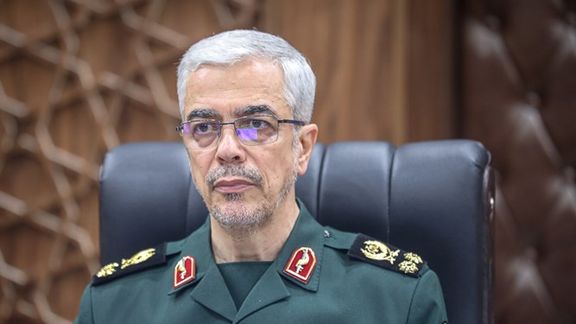
Chairman of the Chiefs of Staff of the Iranian Armed Forces has called for expansion of ties with North Korea to confront any move that disrupts global security.

Chairman of the Chiefs of Staff of the Iranian Armed Forces has called for expansion of ties with North Korea to confront any move that disrupts global security.
Major General Mohammad Bagheri (Baqeri) made the comments Tuesday in a message to congratulate the appointment of General Pak Su-il as the new head of the General Staff Department (GSD) of North Korean Army.
He also wished success for the two countries in achieving their objectives.
Tehran’s ongoing cooperation with Pyongyang can be explained by shared opposition to the United States and the Western alliance. Both countries have also defied the international community by pursuing atomic programs that in case of North Korea has culminated in the production of nuclear weapons.
Iran has had close secret military cooperation with North Koreafor decades and it is believed Pyongyang played a major role in Tehran’s development of ballistic missiles that are perceived as a serious threat by regional counties.
Both countries also pride themselves for being independent and developing homegrown military industries, although both have had close ties to Russia and China.
While Iran’s ballistic missile development and its nuclear program have been the most consistent areas of Pyongyang’s technological assistance for decades, the cooperation is believed to have continued since the Iran nuclear deal was sealed in 2015.

German airlines Lufthansa has suspended flights to Iran due to the security situation after a drone attack on a munitions factory located near the city of Esfahan.
"Together with national and international authorities, Lufthansa Group Security continues to evaluate the security situation for arrivals and departures for Tehran Airport and the entire Iranian airspace," the group continues.
"As soon as we have detailed information, we will decide whether or when our Iran flights can be operated again".
Austrian and Swiss airlines also canceled their flights to Tehran on Sunday.
One of the military facilities of the Islamic Republic in Esfahan was targeted by a drone attack Saturday night, causing explosions. Officials of the Islamic Republic claimed it did not cause any casualties and much damage.
A day later, the Wall Street Journal reported that the attack on the military center for research and development was carried out by Israel, according to informed sources in the United States.
In January 2020, a Ukrainian airliner taking off from Tehran amid tensions between Iran and the United States was hit by two air defense missiles fired by the Revolutionary Guard. All 176 people onboard died in the incident.
No official in Israel has yet commented on the issue. In the past years, Israel has been accused of carrying out several operations against Iran's military industries and nuclear facilities.
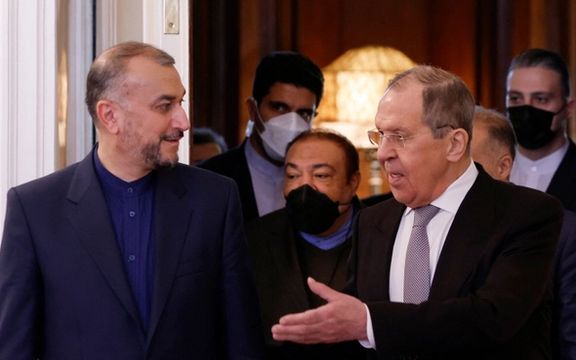
Commentators and former officials in Iran are increasingly warning about Tehran’s close cooperation with Moscow and its impact on the country’s isolation.
Former head of Iranian parliament's National Security and Foreign Policy Committee Heshmatollah Falahatpish told local media: "If it were not for the issue of sending Iranian drones to Russia to be used in the war in Ukraine, Europe was highly unlikely to ratify a resolution against Iran."
Falahatpisheh, who is one of the few domestic critics still allowed to speak to print media, further said he is worried that Iran might become the second front in Russia's war against Ukraine.
The conservative pundit explained that Europe and the United States had agreed [in March 2022] on two matters – Iran upholding its nuclear commitments and the West reducing sanctions imposed, but at the last moment Russian negotiator Mikhail Ulyanov said that Russia cannot take part in implementing the agreement because of US sanctions on Moscow.
"Later Russian Foreign Minister Sergey Lavrov said that Russia would sign the agreement only if all of Russia's nuclear, trade, and military dealings with Iran are exempted from the sanctions. This led to an impasse and the talks were suspended," Falahatpisheh said.
Meanwhile, in an interview with moderate proreform Rouydad24 website, Falahatpisheh charged that some Iranian officials behave in a way as if they are paid to speak against Iran's national interests.
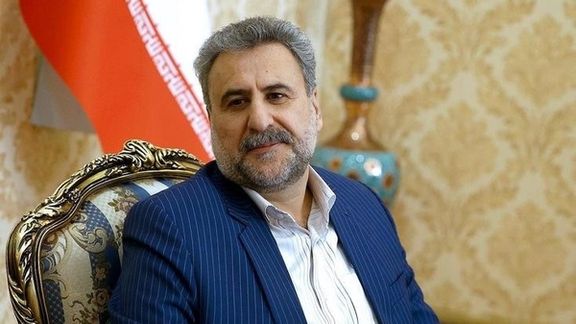
He added that "Statements made by a group of people who have no knowledge of foreign policy have only led to a catalogue of threats against Iran." He was probably referring to individuals such as ultraconservative presidential aide Saeed Jalili and his likeminded allies in the parliament particularly ultraconservative Paydary Party members who staunchly oppose the revival of the 2015 nuclear deal or effectively any agreement with the United States.
Meanwhile, accusing the Islamic Republic of weakening the political elites, Falahatpisheh charged that "Some of Iran's politicians have no proper definition of the government and mainly believe in running the country's affairs like a militia. They have no understanding of the concepts of government, development, international relations, détente, international economy and other political concepts. They do not care what will happen to the next generation of Iranians as a result of Iran's isolation. And that is dangerous."
Falahatpisheh argued that many of the sanctions against Iran are the outcome of such a political approach. "While Iran owns two third of the Persian Gulf waterways and it should naturally attach high importance to the waterway's security, some members of parliament and others threaten to close the Strait of Hormuz. The current situation of Iran and its isolation is a legacy of this kind of grandstanding."
He also said that measures such as sending drones to Russia leads to the IRGC being listed as a terrorist organization in the West rather than the Russian army.
In a related development, Ahmad Bakhshayesh, another former member of parliament's National Security and Foreign Policy Committee said in similar remarks that "The Iranian government believes creating a foreign enemy will lead to solidarity inside the country.”
Referring to the recent drone attack on a military installation in Esfahan, Bakhshayesh said: "Benjamin Netanyahu creates foreign crises as a way of dealing with political divisions inside Israel." Meanwhile, he charged that "the attack was done by Israel from the Republic of Azerbaijan as part of Israel's confrontation with Iran as a country that harasses Israel by its presence in the Golan Heights and its support of the Lebanese Hizballah."
Bakhshayesh added that Iran has recently armed [its proxy groups] in the West Bank, in an area only 15 kilometers away from Israel. He characterized this action as "creating permanent tension" in that region.
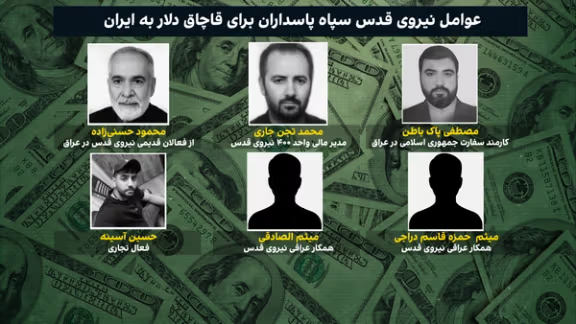
Iran International has obtained information that unravels some details about the inner workings of a Revolutionary Guard’s Quds force unit tasked with smuggling money from Iraq to Iran.
According to the information, the Islamic Republic’s embassy in Iraq is also involved in the money laundering operations that aim to funnel the regime’s revenues from oil and gas exports to Iran. As per a repeatedly extended sanctions’ waiver by Washington, Tehran is only allowed to import medicine and some essential goods in exchange for its export to its neighboring country.
Iran International television revealed that Mohammad Tajan-Jari, the financial manager of the 400th unit of IRGC’s Quds Force, was in charge of transferring the funds to the unit’s account in a branch of Ansar Bank in the capital Tehran. The bank had been founded by the IRGC in 2010 and was officially merged into the IRGC’s official Bank Sepah. The IRGC had established several banks and credit institutions to help it in its money laundering operations and circumvent US sanctions but after they served their purpose and their affiliations were disclosed, all of them, including Ansar Bank, Mehr Eghtesad Bank, Hekmat Iranian Bank, Ghavamin Bank and Kowsar Credit Institution, were merged into Bank Sepah from 2018 to 2020.
In Iraq, the network is apparently managed by an old Quds Force operative identified as Mahmoud Hasanizadeh, who oversees the job with the help of two Iraqi citizens. Tajan-Jari's executive officer in Iraq is Mostafa Pakbatan, an employee of the Embassy of the Islamic Republic and a member of the Quds Force, who receives the dollars from exchange offices in Iraq. He is not the only employee of the embassy involved in the money laundering network. The current ambassador, Mohammad-Kazem Al-e Sadegh, who was appointed to the post less than a year ago was also a commander of the Quds force and one of the close aides to former chief Qassem Soleimani, who was killed by a US drone strike in January 2020 in Baghdad.
About a year ago, during the tenure of Iraj Masjedi as the ambassador of the Islamic Republic, Al-Arabiya published a document that showed more than 60 billion Iraqi dinars (about $40 million) from the assets of Iranian energy companies were deposited into the account of the Iranian embassy in the Trade Bank of Iraq, which was supposed to be used for the expenses of the embassy. However, it ended up in the hands of Quds force officers.
This financial network is bypassing the US sanction regimes at the cost of the Iraqi economy. An informed source in Baghdad told Iran International late in December that Washington has received reports that Iraq is still conducting trade with Iran using US dollars despite sanctions.
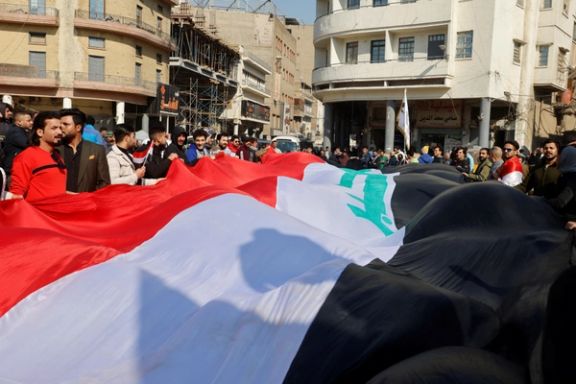
According to a report by London-based newspaper Asharq Al-Awsat, the decline in the value of Iraq’s national currency and the accompanying price increases for foodstuffs and imported goods can be traced back to remarkable change in the policy adopted by the US Treasury and the Federal Reserve Bank of New York. The impact of US banking sanctions on Iran has affected neighboring Iraq, weakening its currency and leading to protests against the government.
The dinar went into a tailspin against the dollar after the New York Federal Reserve imposed tighter controls on international dollar transactions by commercial Iraqi banks in November to halt the illegal siphoning of dollars to Iran.
Under the curbs that took effect this month, Iraqi banks must use an online platform to reveal their transaction details. But most private banks have not registered on the platform and resorted to informal black markets in Baghdad to buy dollars.
This has created dollar shortages as demand has outstripped supply and accelerated the dinar's fall against the greenback. Last week, hundreds of Iraqis demonstrated near central bank headquarters in Baghdad to protest at the recent slide of the Iraqi dinar against the dollar that has triggered a rise in prices of imported consumer goods.
Following demonstrations a delegation of Iraqi officials is set to travel to Washington to resolve issues related to US banking restrictions.

Pakistani media report that Tehran has warned Islamabad to construct its portion of the Iran-Pakistan gas pipeline until March 2024 or pay a penalty of $18 billion.
Iranian officials have communicated the message to a visiting Pakistani delegation about three weeks ago, a senior official of Pakistan’s Ministry of Energy told the media.
According to the official, Iran has stated that the US sanctions on Tehran are illegal and Pakistan, is bound to construct the 780-kilometer pipeline on its portion till February-March 2024.
The Islamic Republic has already completed part of the pipeline in its territory from the gas fields in the west to the border with Pakistan in the east.
The 25-year contract to export Iran's natural gas through a pipeline to Pakistan was signed between the two countries in 2009 and was supposed to be implemented by 2015, but international and US sanctions against Iran and Washington’s pressure on Islamabad have prevented its implementation so far.
The two sides inked a revised deal in September 2019. Iran agreed not to approach any international court if Pakistan would finish the pipeline until 2024.
Now the Iranian authorities have warned that there is only a short time left until March 2024, adding that if Pakistan does not complete the pipeline within 15 months, Tehran will demand $18 billion in compensation for the losses from laying the pipeline to the Pakistani border.
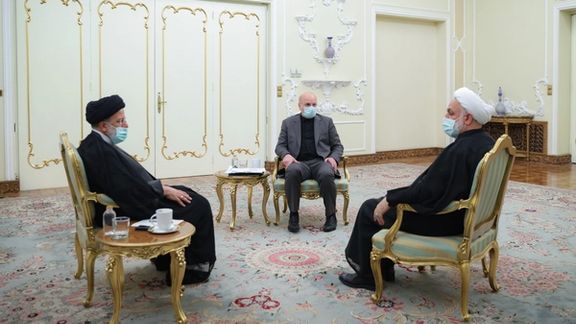
The Islamic Republic has embarked on a journey to raise capital by selling public properties, a move that has people and pundits concerned about its repercussions.
The country’s parliament is trying to fiddle with existing laws to make the measures seem in accordance with the constitution. Supreme Leader Ali Khamenei has given his blessing, trying to sell the idea as long overdue, which should have been guiding principle in the early years of the regime.
The shady privatization plan, which is promulgated to improve the generation of wealth and production in Iran, has been met with a lot of skepticism by the public, who have seen corrupt “privatization” in the past 15 years, when state properties were sold at ridiculously low prices to well-connected individuals.
The clerical regime – struggling with domestic unrest and grappling with rising inflation on the backdrop of global isolation – is in desperate need of money. People are terrified that the plan is the Islamic Republic’s last-ditch effort to liquidate public assets to keep itself afloat.
On Monday, Ali Khamenei met with a group of businesspeople urging them to help kickstart the country’s economy. He stressed on the necessity of economic growth to reduce the hardship people face.
Khamenei, who almost never acknowledges the country’s problems and always blames the “enemies” for everything, said that Iran is at least a decade behind in its economic development. Calling for the privatization of industries, he said important mistakes were made in the early years of the Islamic Republic by making all major economic sectors run by the government.
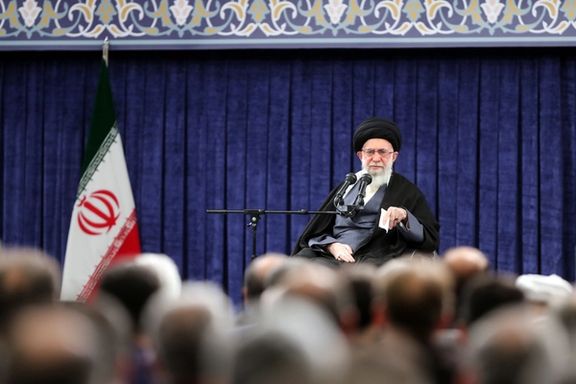
"The country will not be run without the activities of private enterprises, and these enterprises will not engage in such businesses without the support of the government, and if they do, they will not be successful,” he added.
Iranian media and economic experts are characterizing the privatization plan that officials keep vague as "a plunder of public property" and "economic apartheid."
According to reports, the new privatization plan approved by the heads of the three powers of the government, President Ebrahim Raisi, Majles Speaker Mohammad Bagher Ghalibaf and Judiciary Chief Gholamhossein Mohseni Ejei bars critics of disclosing details of transactions and suspends for two years all legislation that might prevent these transactions.
The transactions are going to take place under the supervision of a seven-man team, comprised of Vice President Mohammad Mokhber, Economy Minister Ehsan Khandouzi, Interior Minister Ahmad Vahidi, Roads Minister Mehrdad Bazrpash, Planning and Budget Chief Massoud Mirkazemi, and two representatives of the Parliament Speaker and Judiciary Chief, who are not appointed yet. The members of the taskforce are said to have absolute judicial immunity.
Critics say that secrecy and immunity will give way to financial corruption as the seven-member board has the right to determine the prices for the transfer of assets to the private sector.
In an article on Monday, Rouydad24 website labeled the move as “putting on auction the people’s properties,” elaborating some of its “horrible” points. The article said that the move is one of the most questionable decisions ever approved by the country’s leaders.
“It has never happened in the history of Iran that seven people make decisions for the entire capital and future of a nation without being accountable for anything,” read the article.
One of the clauses of the resolution gives the group the power for two years to overrule all laws and regulations that are already in place to block the sale of public properties. It means the current administration is coordinating with other branches of the government to suspend all current laws to do whatever it wants, fueling speculations that the government predicts it would not be able to stay office in the next election.
Gholam Ali Jafarzadeh, a former lawmaker, has said that such an extrajudicial taskforce may be justified during wartime, asking what strange thing has happened now that justifies such a decision.
The article described the long list of the public assets that are to be sold as “frightening,” especially because the government doesn’t have information about the exact value of the assets. “What is more frightening is that the properties are supposed to be sold without legal formalities,” it added.